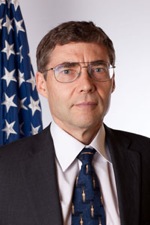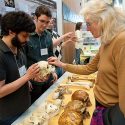Nobel laureate, White House advisor to speak about science education
Carl Wieman, associate director of the White House Office of Science and Technology Policy (OSTP) and a Nobel laureate in physics, will visit the University of Wisconsin–Madison Tuesday, March 20 to talk about teaching and learning in science and engineering.

Weiman
“Dr. Wieman is a very influential physicist, and he has a deep commitment to transforming the way we do science education,” says Susan Millar, emeritus director of education research at the Morgridge Institute for Research, which is sponsoring Wieman’s visit.
Wieman will deliver a free public talk, “Taking a Scientific Approach to Science and Engineering Education,” at 2 p.m. in the DeLuca Forum at the Wisconsin Institutes for Discovery, 330 N. Orchard St.
Provost Paul M. DeLuca Jr. and Constance Steinkuehler, a UW–Madison assistant professor of education on assignment as senior policy analyst at OSTP, will welcome and introduce Wieman, whose talk will be followed by a reception.
Wieman’s presentation is a particularly interesting opportunity for researchers on campus, according to Millar.
“I believe his talk will be of special interest to science faculty,” she says. “On the basis of my experience, essentially everyone balancing teaching and research in the sciences and engineering at UW–Madison cares deeply about education, but there’s not a lot of time for them to think about how to do their science education better. Dr. Wieman will address this.”
Wieman’s visit to campus also includes meetings and roundtable discussions with scientists and science education researchers.
A graduate of the Massachusetts Institute of Technology and Stanford University, Wieman has conducted extensive research in atomic and laser physics. Among his numerous awards is a share of the 2001 Nobel Prize in Physics, garnered for creating a new form of matter known as “Bose-Einstein condensation.”
Prior to his appointment to a White House position in 2010, Wieman served on the faculty at the University of British Columbia and the University of Colorado as a physics professor and director of collaborative science education initiatives. He has worked extensively on research and innovations for improving science education, and was the founding chair of the National Academy of Sciences Board on Science Education.


